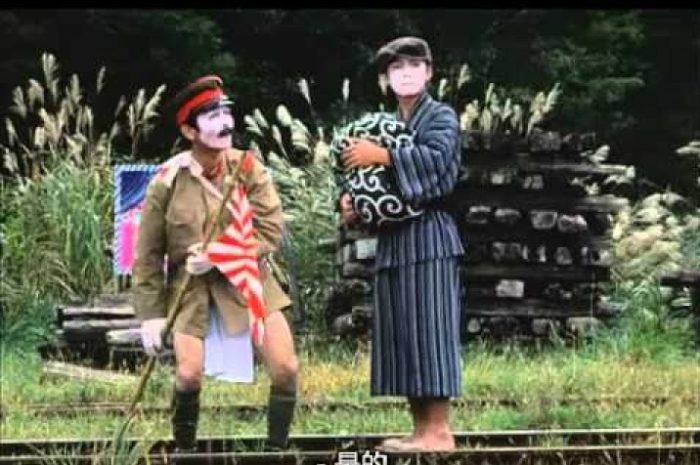Lyrics by Shuji Terayama; music by Hiroshi Kato; performed by The Folk Crusaders. The English translation is as follows.
I don’t know the names of the flowers of the field
But I like the flowers blooming in the field
When I pick them for my hat
For some reason the tears come, tears come
I know nothing of the days of war
But I don’t have a father
When I think of my father
The evening sun sinks over the wilderness, the red evening sun
Sad father who died in battle
I am your daughter
In this hometown twenty years on
I will marry tomorrow, marry
Please look, my faraway father
Under a sky streaked with mackerel clouds
I’m just twenty years old and know nothing of war
I will marry and become a mother, a mother
I don’t know the names of the flowers of the field
But I like the flowers blooming in the field
When I pick them for my hat
For some reason the tears come, tears come
The song, also recorded by Carmen Maki and other well-known artists, is associated with the late 1960s folk boom and the protests against the Vietnam War, though the tone is more wistful than condemnatory. There are echoes of Pete Seeger’s Where Have All the Flowers Gone, but also some characteristically Terayama-esque touches.
Time is passing; the girl has no memory of the war, nor of her dead father; she is pregnant and a new generation will soon appear to whom the bloody sunset of the Japanese empire will mean absolutely nothing.
Strangely for a country girl, she doesn’t know the names of flowers, nor is she interested in history. Experience matters, not words and facts. It’s the mid-1960s and the important thing is to BE HERE NOW.
The flowers soon to die, the time passing – these things make her melancholy. As for her father, he’s long gone. In fact he never really existed.
Shuji Terayama had direct experience of war and did not forget it. Rather, he appropriated it and turned it into a highly personal theme in the world of his imagination. Terayama liked to tell people that his own father was executed as a war criminal. The truth was more mundane. Terayama senior died of dysentery in the Philippines, a fact which became known to his wife and child only after the surrender.
coming to the cliff to throw away
one of my dead father’s toothbrushes
for a while I stare into the blue
Young Shuji was living in Aomori with his mother when 80% of the town was destroyed in an American fire-bombing raid. They managed to escape and after the war the two of them moved to Misawa where Terayama’s mother got a job as a cleaner on the new American air-force base. Even today, a quarter of the town’s inhabitants are American military personnel.
I don’t accept wars of any kind, but that certainly doesn’t mean I like peace – Shuji Terayama, from Let’s Anger Everyone
The Folk Crusaders had formally broken up before this song was released as a single B-side in November 1968. The group had formed around Osamu Kitayama, who went on to have a distinguished career as a psychiatrist and cultural critic, and Kazuhiko Kato, the son of a Buddhist priest who was inspired by hearing Bob Dylan on the radio. Kato developed a solo career, where his penchant for covering songs by British folkie Donovan earned him the nickname “Tonovan.”
He subsequently married Mika of the Sadistic Mika Band, one of the few Japanese bands of the 1970s to make an international impact, and became their producer. Plagued by depression, he took his own life in 2009.
Suffering never changes; what changes is hope – Shuji Terayama, from To Lonely You
